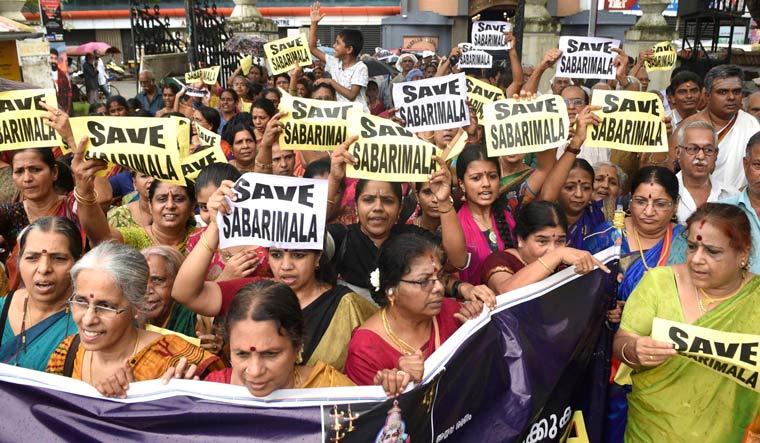The ruling CPI(M) plans to involve women in an agitation to counter the one launched by Hindu organisations on the issue of entry of young women to Sabarimala temple.
In first stage of the protest, women associated with the party's Democratic Women's Association will gather at the new bus stand in Pathanamthitta on October 13. P K Sreemathi, CPI(M) Central Committee member, will kick off the demonstration.
All panchayats ruled by the CPI(M) have been alerted to mobilise workers of Kudumbasree and the Mahatma Gandhi National Rural Employment Guarantee (MGNREGA) scheme for the gathering.
With the CM Prinarayi Vijayan taking firm stand that the court verdict will indeed be implemented, different Hindu organisations have also announced agitation plans.
On September 28, in a 4:1 judgment, the apex court said the ban on women in the menstruating age group, whose presence in the Lord Ayyappa temple was considered to be 'impure', violated their fundamental rights and constitutional guarantee of equality. Until now, only girls below 10 years and women over 50 years were allowed to visit the hilltop shrine.
The bigger picture
The most revolutionary part of the Supreme Court verdict in the Sabarimala case was the court's decision to toss out a rule that had equated menstruating women with lepers, beggars, drunkards and lunatics. The entry of women into Sabarimala, however historic the ruling, has consequences only for the temple. But the 'decriminalisation' of menstruation will dramatically change the way thousands of temples in the state will be administered in future.
It looked as if the Supreme Court piggy-backed on the Sabarimala issue to lunge and strike hard at an entrenched belief that made menstruation synonymous with impurity. More than eight decades later, the court has widened the sweep of the Temple Entry Proclamation. Outcasts Section 3 of Kerala Places of Public Worship (Authorization of Entry) Act, 1965, drawing inspiration from various progressive movements like the Temple Entry Proclamation, states that no Hindu, with exception of class or caste, be prohibited from entering a place of worship.
Henceforth, no legal hurdle stands in the way of a menstruating woman wishing to enter a Hindu place of worship. The Hindu orthodoxy however feels, will strike at the very foundation of Hindu faith. “It is not about impure blood,” they insist. “It is about the violation of compact temple rules laid down in times immemorial by highly evolved minds,” they said.
Clockwise anti-clockwise conundrum Kshethra Ekopana Samithi chairman and author M P Appu, explaining the esoteric science, said: “The energy that emanates from the deity moves in a clockwise direction. But the energy that passes out of a woman in periods moves in an anti-clockwise direction. So the entry of a woman in periods will disturb the equilibrium of the temple. The divine energy of a temple will diminish as a result,” Appu said.
To emphasise that the restriction is not women-specific, he said the reverse flow would be worse if a man who lost a close relative enters a temple before the prescribed period of mourning.
While the thanthris use ancient scriptures like 'Thanthra Samuchayam' to argue their case, the apex court had held up the country's most revered moral guide: the Constitution. Here is what Justice D Y Chandrachud said: “The social exclusion of women, based on menstrual status, is but a form of untouchability which is an anathema to constitutional values.” The court said values of constitutional morality were non-derogable, meaning it cannot be suspended even during times of emergency.
Justice Chandrachud also said, “Women have a constitutional entitlement that their biological processes must be free from social and religious practices, which enforce segregation and exclusion. These practices result in humiliation and a violation of dignity. Article 17 prohibits the practice of 'untouchability', which is based on notions of purity and impurity, in any form.”
“The entry of menstruating women will only further in diminishing the tantrik purity of temples,” he said. Bhattathiri said the ancient texts or 'sastras' that prescribed compact rules for temples can be found in Thanthra Vidya Peedham, Aluva.
Kalidasa Bhattathiri also fears that uncertainty would soon creep into religious rituals from now on. “When the priests now conduct pujas they know at the back of their mind that certain divine principles have been undermined. They will start losing faith in the pujas they themselves conduct. In the long run, temples will lose their divinity,” he said.
However, the short term impact will be on the women employees of devaswom boards. Take for instance the Travancore Devaswom Board. It has over 1,000 women working in 'kazhagam' and 'thali' wings in various temples. It also has 75 women in the administrative department. While the administrative staff had special leave during periods, the daily 'kazhagam' and 'thali' workers had a special allowance of Rs 300 for the five days they were not supposed to enter temples. ('Kazhakam' workers make the garlands for the deity and 'thali' workers clean the puja utensils.).
Now with the Supreme Court throwing out Rule 3(B), women workers are caught in a dilemma. Their faith does not allow them to enter a temple during their menstrual cycle but under the changed circumstances they will not be entitled to their special privileges. The situation is similar for Devaswom women employees were posted at Pamba during the 'mandalam' and 'makaravilakku'. The Travancore Devaswom Employees' Front, Travancore Devaswom Board's biggest union, has decided to file a review petition against the SC verdict.
—With inputs from Ayyappan R, Onmanorama


